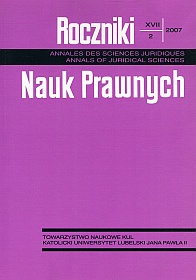Konkubinat w prawie kanonicznym oraz w polskim prawie cywilnym
Abstrakt
The problem of lascivious cohabitation occurs in both systems of law as both of them regulate the problems relating to marriage. The Code of Penal Proceedings expressly uses this term, while in Family and Guardianship Code this term does not occur. Additionally, such cohabitation is understood differently by Canon Law as opposed to Polish Civil Law. Civil Law does not distinguish between lawful cohabitation and a notorious one. Civil Law does not favour lascivious cohabitation, while Canon Law treats it as a crime under certain circumstances. In Polish Civil Law, such cohabitation appears to be no impediment to contracting a marriage, however in Canon Law this kind of impediment does exist. In the former case lascivious cohabitation is recognised mainly in Property Law which applies to both of the cohabitants, whereas Canon Law does deal with these matters. Polish law treats a Catholic marriage that has been contracted without legal consequences as a case of lascivious cohabitation, but according to Canon Law it is a sacrament.
Copyright (c) 2007 Roczniki Nauk Prawnych

Utwór dostępny jest na licencji Creative Commons Uznanie autorstwa – Użycie niekomercyjne – Bez utworów zależnych 4.0 Międzynarodowe.


